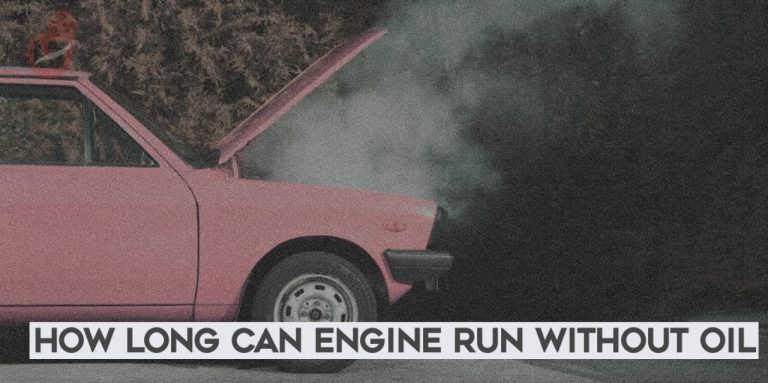Engine Oil is relevant to moving parts in automobiles such as cars, bikes, bicycles, and even aircraft.
A deficit in the amount of oil can result in those moving parts rubbing against each other, and you already know the result – wear and tear and engine failure/knock.
It shouldn’t sound to you a surprise that driving your engine without oil can result in sparks which can, in turn, cause a fire outbreak.
This is why I’ll always advise car owners to check their Oil level to avoid getting in a situation where they’ll have to ask, “How long can an engine run without oil before the damage.”
Ideally, an engine can run perfectly without oil depending on the style, model, load, previous oil type, and operating temperature.
So, depending on the type of engine model and exposure to oil, an engine can run continuously without oil for 5 – 90 minutes.
While it’s not advisable to drive with an empty engine oil tank, knowing how far your car can carry you in an emergency is still relevant.
Likewise, it’s also good to get acquainted with some of the functions of engine oil and some notable signs of an oil shortage.
What Oil Does to the Engine
Most car owners downplay the importance of oil in their vehicles when it plays a significant role in the combustion process that happens in the engine.
Here are a few of the significance of engine oil to your car.
- Engine Oil serves as lubrication to moving metallic engine component
- Prevent rust and wear and tear of engine components
- Engine Oil also serves as a coolant
- It helps prevent engine failure or knocking
- Aids the exhaust system
- It helps prevent the accumulation of debris or dirt, which could lead to blockage.
- Intermediary between the pistons and cylinder
- Reduces friction
Symptoms of Engine Oil Shortage
Sometimes, we might forget to refill our engine oil, but you shouldn’t ignore the common signs telling you that engine oil is needed in your car.
Ignoring the symptoms could cause fire, breaking of engine parts, or purchasing a new engine.
1. Black Smoke from the Exhaust
The most common symptom of empty engine oil is black smoke emerging from the exhaust, primarily due to oil management by the engine components.
A cloud of black smoke could also denote that your oil needs to be changed, mainly when used for a long time.
2. Noise from the Engine
The noise part is inevitable since there’s friction between two metal surfaces. This usually results in breaking engine parts which could further damage other factors resulting in knocking.
As you accelerate further, you can hear two metals clanging from your engine producing metallic noise (the pistons, crankshaft, and rod bearings)
You should park the car at this point and get oil to prevent future damage.
3. The Oil Pressure light will turn on
This indicates that you need to get an oil replacement or refill. The check engine light doesn’t lie unless in a case of electrical misconfiguration.
4. Overheating
You’ll notice that your car temperature on the temperature Guage will rise abnormally due to the reaction between two bare metals in your engine.
This will result in excess heat and smoke coming out of the engine.
5. Excess Fuel Consumption
Due to the pressure exerted by the metals on each other, they’ll consume more fuel to keep working until they eventually get damaged.
6. Burning Smell from Engine
The heat from the reaction could result in sparks which can eventually cause fire and start burning plastic parts of your car.
Once you notice a burning smell, you should park, perform a visual inspection, and ensure it’s resolved.
How Long Can an Engine Run Without Oil Before Damage?
If you don’t want to damage your car engine, I’ll advise you to keep spare engine oil on your car dashboard in emergencies like this.
However, as I said earlier, the distance an engine can run without oil totally depends on the model, design style, and the load it’s carrying.
For instance, a straight V6-engine cylinder with zero friction between the walls will likely last longer than a V-styled engine.
Also, the oil’s viscosity in the engine is vital in how long an engine can run without oil.
A car with low oil will likely go far with just the driver than when it carries heavy objects or full passengers due to the force exerted on it.
In addition, an engine whose heads, cranks, and blocks have absorbed enough oil will likely run farther without load on it.
So, an engine is supposed to run between 5 minutes to 90 minutes without oil provided certain conditions are met.
According to real-time experiments, Ford and Chevrolet have – a maximum of 5 minutes, foreign cars – Max of 10 Minutes, Mercedes-Benz – 10 to 20 minutes, and V6 and V8-cylinder engines – 30 to 90 minutes.
That’s all.
Conclusion
Driving a car without engine oil is equivalent to starting a generator without engine oil.
You’ll notice black smoke, stalling, and cranking noise from the engine until the engine finally damages from the coercion.
This article has shown you that different engine models have different tolerance for driving without oil.
However, you must check your engine oil before it drains up to maintain a lifelong engine.
As an Amazon Service LLC Program Associate, V. Auto Basics earns from qualifying purchases. See Our Affiliate disclaimer.
